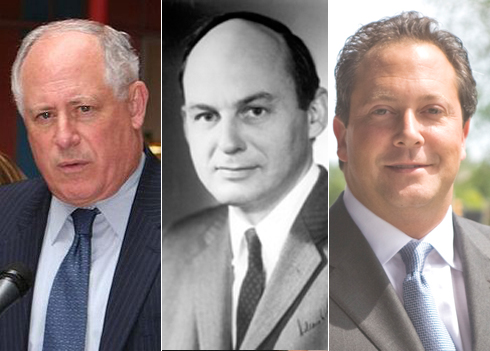Former Sen. Adlai Stevenson III (D-IL), who ran for governor as an independent in 1986 after he was saddled with an unacceptable running mate for lieutenant governor in the primaries, just told TPMDC that if he were in the situation that Gov. Pat Quinn (D-IL) is today, with controversial candidate for lieutenant governor Scott Lee Cohen, he would do the same thing — quit the Democratic ticket, and run as an independent.
“Well, you know I’ve been asked that over and over again, and I just don’t want to be presumptuous by advising the governor what to do,” said Stevenson, when asked if Quinn should run as an independent. “I’m saying what I did. I could not run in good conscience with someone unqualified as my running mate for lieutenant governor, so I resigned and ran as an independent.”
When asked if he would personally run as an independent rather than run alongside Cohen, Stevenson answered: “Absolutely. No question about it.”
Cohen has faced controversy since he narrowly won a six-way primary on Tuesday, with allegations involving past domestic violence, steroid use, being behind on child support payments, and even possible attempted sexual assault of his then-wife. Cohen has admitted to steroid use, but has thus far refused to give in to calls that he withdraw.
In Illinois, candidates for governor and for lieutenant governor run in completely separate primaries, but then run together as a joint ticket in the general election. Back in 1986, Stevenson became the Democratic nominee for governor. His campaign was effectively derailed, however, when activists for fringe political leader Lyndon LaRouche won the Democratic primaries for lieutenant governor and secretary of state.
Rather than campaign for office with a LaRoucheite running mate, Stevenson took the extraordinary step of abdicating the Democratic nomination, and running for governor on a specially-created ballot line called the “Solidarity Party.”
“I was strongly advised by my running mates and others to stay on the ticket, run, we’re gonna win anyway,” said Stevenson. “But that wasn’t the test. I couldn’t in good conscience run, joined at the hip to a cultist, and put him within the proverbial heartbeat of the governorship, and the answer was no, I could not do that.”
In order to do this, he had to field candidates for all the other statewide offices, as well, though the only seriously contested races were for governor/lieutenant governor, and for secretary of state. “And so we had to explain to people, they had to vote the straight Democratic ticket and then cross over and just vote for the Solidarity Party for governor, lieutenant governor and secretary of state — with no money. Nobody gave us a chance.”
Stevenson ultimately lost his 1986 race to incumbent Republican Gov. Jim Thompson, taking 40% of the vote. He is convinced that if this mess had not happened, he would have been elected governor. “It would have been a landslide. I won 40 percent as a solidarity candidate,” said Stevenson. “The Democratic regular slate got eight percent. Thompson won with 52 percent. I had no money. There’s zero question.”
Stevenson pointed out that if Quinn were to run for governor as independent, he would not have as many of these difficulties. Under current election law, he could simply mount an independent candidacy without having to find a whole new slate of statewide candidates. Also, voters in Illinois can no longer check off a single place on their ballot to vote a straight party ticket, but instead must vote in each race individually. In the 1986 race, the Stevenson campaign had to educate voters to not vote straight-ticket, which isn’t an issue anymore.
Stevenson blamed the current situation on a breakdown in the Democratic Party’s structure. The voters were not properly informed, he said, which allowed Cohen to win a divided race by financing his own campaign.
“Nowadays, I think if you’re running for governor, and there’s a whole field of candidates out there, and you just spot somebody for whatever office that is clearly unqualified, I think you have a duty to tell the people,” said Stevenson. “That did not happen this time. The party organization is really dead.”






